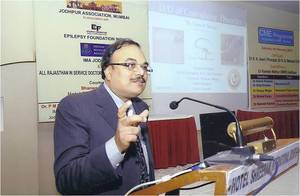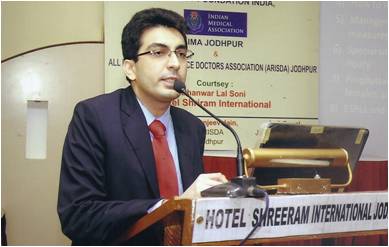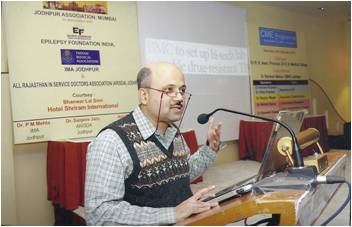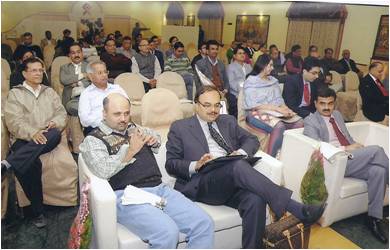Epilepsy FoundationHelping the epileptic people 10 Mar 2012 “Epilepsy is one of the most often misdiagnosed, mistreated, or under-treated conditions ever.” – James Firman. Imagine having seizures repeatedly in life-threatening situations but unable to afford treatment for it. Imagine being pregnant and chased away from your husband’s house for having an epileptic attack. Imagine being ridiculed by peers for having a seizure on the school playground. Epilepsy though a treatable ailment, finds itself clouded by so much stigma and myth that patients often suffer it under cover and sometimes do not even approach a doctor or a public forum to share their experiences. Also, many times patients can’t afford its treatment. Neurologist Dr. Nirmal Surya has been striving to dispel the myths surrounding Epilepsy and to bring the victims out of the shadows for years. He has been running a free Epilepsy clinic from 1992 for poor patients who cannot afford regular treatment. In 2009, he established the Epilepsy Foundation in Mumbai, as a non-profitable charitable organisation dedicated to giving people living with seizures, a more fulfilling life and to change the perception that society has about Epilepsy. The Foundation also promotes research for finding a cure of Epilepsy. Epilepsy is a disease affecting 1 in 1000 children and 1 in 100,000 adults. It is more common in children because their brain is still immature. A seizure happens when there is a sudden, high frequency discharge of neurons in the brain. The reasons are difficult to diagnose. In Primary epileptic attacks, there is no reason at all, while in Secondary epileptic attacks, the cause could be a tumour, infection, trauma or vascular accidents. The most common type is generalised tonic-clonic seizures characterised by sudden jerking of body, rolling up of eyeballs, frothing from the mouth, heavy breathing and loss of consciousness. Most often it happens during sleep and the patient has no memory of the attack. The other types are simple seizures, where there is motor or sensory paralysis but no loss of consciousness. Epileptic patients can live a normal life and history has a shown a few great men such as Julius Caesar, Alexander the Great and Napoleon Bonaparte as having fought Epilepsy. In an enlightening conversation with Dr. Nirmal Surya, we delved deeper into the issues surrounding Epilepsy, his organisation’s efforts to combat this ailment and the success they have achieved so far. What motivated you to found Epilepsy Foundation? There were so many of my patients with Epilepsy who couldn’t afford the medication to treat it; I saw parents hiding the fact that their daughters have Epilepsy fearing social stigma, getting them married and finally seeing their pregnant daughters being chased away by in-laws house for having a seizure. I wanted to help dispel the fear and stigma attached to the disease and reach out to those poor patients who suffered the disease in silence, unable to afford its treatment. Tell us more about your organisation’s work. On a weekly basis, we hold a free clinic every Tuesday at my clinic at 1 PM where free consultation and medicines are given and all tests are done at 50 per cent of the cost. We have about 70-75 patients coming in during these sessions. We have public meetings on the last Tuesday of every month at the Bombay Hospital, where we raise awareness about Epilepsy, its treatment and possible cure. Under the National Rural Health Mission, supported by the Government of Maharashtra we have held successful rural camps. In 2011 we held seven camps in Nashik, Satara and other districts of Maharashtra. We gave free treatment to over 2000 patients with a team of 10 doctors and some staff. These camps were very well appreciated by the Government. During these camps, we also give out educative material, books, and CDs to raise awareness. A tele-medicine centre is run by the Government at the Epilepsy Foundation where free consultation is given to remote rural patients. Also we have a released a short movie ‘Asha – The Hope’, which helps dispel the myths surrounding Epilepsy and create awareness among patients, their caregivers and the society in general. It hopes to give patients and caregivers the strength to fight and live a normal life. Is Epilepsy preventable? 10 per cent of Epileptic cases are preventable if two simple measures are followed. Wear a helmet always to prevent head injury during travel and avoid eating raw, leafy vegetables without cooking or properly washing. Tape worm cysts can cause Epilepsy and raw leafy vegetables contain Tape worm eggs. Also if diagnosed early, Epilepsy is completely treatable and can be cured. What is in store for the present year? Following the success of our rural camps, we have been asked by the Government to conduct such camps in Jawahar in April 2012 and have also planned similar camps in tribal areas. A day camp has been planned in Ratnagiri on May 27. We believe surgery can cure epilepsy, but its prohibitive costs have resulted in only 100 such operations in the entire country in a year. We are encouraging this surgery by paying for poor patients and by raising awareness about it. We request volunteers to spread awareness about Epilepsy and adopt just one patient’s medication. Our organisation and the one soul, whose life will be saved, will forever be grateful. Contact Details Surya Neuro Center, 310-Lotus House, 33-A, New Marine Lines, Mumbai - 400 020 Phone: 022-2200-1180 022-2200-1181 E-mail: epilepsyfoundationindia@gmail.com Official Website By, Gayathri V Patil |
Monday, March 19, 2012
http://specials.msn.co.in/sp11/india365/archives_story.aspx?ID=b2d47083-9291-4969-b9b6-12f99c0661f5&index=196
Tuesday, March 6, 2012
CME by Epilepsy Foundation at Jodhpur on 4.2.12
Jodhpur CME:
Epilepsy foundation organised the CME in association with Jodhpurs Association and IMA Jodhpur on 04th February 2012, which was attended by nearly 150 doctors from Mumbai and Jodhpur.
The topics chosen were;
1. Recurrent UTI by Dr. Dilip Kriplani Nephrologist who spoke about the various causes, common organism and the people who are susceptible for the recurrent UTI, he also gave the guideline for the investigation as well as treatment.
2. Resisitant Tuberculosis by Dr. Sanjay Wagle who spoke about the present scenario of the Resisitant tuberculosis and the role of the laboratory in identifying that plus what are new drugs available and what combination could be useful in such circumstances.
3. Convulsive Disorder by Dr. Nirmal Surya founder, trustee and chairman of Epilepsy Foundation who spoke about convulsive disorder, he presented video of the various kinds of seizure along with EEG in classifying seizures and how to differentiate them from each other as well as from Pseudo seizures. he also stressed about the role of history and interviewing the witness in identifying seizure disorder, the need to start appropriate drug according to the nature of convulsion is important in treating epilepsy? The other point he highlighted was the need to start mono therapy unless patient has not responded to one drug and then only to add second drug. In final part he mentioned about the role of MRI and future of Epilepsy Surgery in India in curing refractory epilepsy, the lecture was highly appreciated by everybody.
4. Early intervention in Acutecoronay Syndrome by Dr. Ramesh Kawad, Cardiologist who mentioned few of the studies published and their results which clearly shows that in a given circumstances early intervention has better outcome and less mortality and finally he showed a case where early intervention saved the lives of the patients
Chairperson Dr. Aresi, Principal S N Medical College and Dr. Mathur, DHMO Jodhpur summarised the programme and Dr. Sanjiv Jain thanked all the delegates and speakers on behalf of all the Association.
The press too highlighted the CME programme and stressed in the need of similar programme's in the future.




Subscribe to:
Comments (Atom)